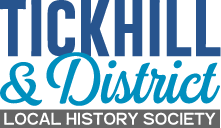

Music
Community music making, both choral and instrumental, has been a popular activity for musicians and their audiences since the 19th century; every church and chapel had its choir, and organisations from the pit to the factory and the Co-op to the Scouts had their own brass band - between 1900 and 1950 no community event was complete without their presence.
Music played an important part in everyday life: from songs accompanied by the ‘whistle and fiddle’ in the local alehouse to the respectability of a family singsong around the piano, from the choral society to the local brass band, this was entertainment that could be enjoyed by all.
Tickhill Jubilee Brass Band
At the beginning of the 19th century, brass bands had begun to flourish not only in large industrial areas, but also in smaller towns and villages where there was little in the way of entertainment. Tickhill’s association with the brass band movement began in 1850, when some members of the Tickhill Troop of volunteers of the West Yorkshire Yeomanry Cavalry formed a band to play at local events. Sixteen years later, the Tickhill Victoria Brass Band, under the direction of Bandmaster, Thomas Watson, a barber of Westgate, gave its first concert at the ‘Concert Room’ on Northgate; it continued to perform for the next 20 years, until it ‘disbanded’ sometime between 1885 and 1886.
The following year, plans were underway in Tickhill to celebrate Queen Victoria’s Golden Jubilee, and a band was needed to perform at events during the two-days of celebrations. Despite advertising in the local area, no bands were available, however, the former members of Tickhill Victoria Brass Band agreed to play if the Local Government Board would provide the instruments - and so Tickhill Jubilee Brass Band was formed. The Jubilee was a huge success, the band, once again under the direction of Thomas Watson, led the parade and played at the sports and the evening dance.
Spurred on by this success, the band flourished, in 1890 it had fourteen members, however following internal problems, Joseph Percy, a tailor of Market Place, was elected Bandmaster; Thomas Watson went on to found the rival Tickhill United Band in 1892, but its success was short lived. The appointment of Charles Thomas Clarkson as Bandmaster in 1896 saw the beginning of his long association with Tickhill Jubilee Brass Band, which, with the exception of two short periods, lasted for the next 37 years. Social activities, in general, were temporarily suspended between 1914-1919 and this extended to band practices, which over the years had taken place in the Club Room at the Carpenter’s Arms, the cycle shop on Castlegate opposite St Mary’s Gate, a room behind Mr Alderson’s shop on Sunderland Street and the warehouse to the rear of Clarkson’s shop on Westgate.
Following the cessation of hostilities in 1919 the band regrouped and by the 1920s it could boast 27 members. Charles Clarkson retired in 1933, and his son, Joseph, a trombone player took over as Bandmaster until the outbreak of war in 1939, when the band ‘disbanded’; sadly it never re-formed.
Over 52 years, Tickhill Jubilee Brass Band enjoyed continued success, playing at garden parties, fetes and flowers shows, church and chapel events, civic parades and Armistice Day, May Day, jubilees and coronation celebrations, and charitable events, such as Doncaster Infirmary Sunday Demonstrations, which raised money for the provision of Doncaster Infirmary before the introduction of the National Health Service. Tickhill did not, however, have ‘first call’ on their services; on May 12 1937, they played at the coronation celebrations at Hesley Hall, whilst Tickhill folk were entertained by Tickhill Boys’ Club Jazz Band!
Tickhill Imperial Dance Band
The arrival of jazz and swing from America in the inter-war years led to the formation of many successful dance bands - both professional and amateur. Tickhill Imperial Dance Band, featuring Charlie Timpson on trombone, Harold Bingham on saxophone, Joseph Clarkson on trumpet or piano, Alf Herring on cello and Mark Jackson and Cyril Whinfrey on violins, were always in great demand and played at venues in the Tickhill area, including the Dance Hall above Tickhill Co-op and the Public Library, both on Castlegate.
St Mary's Church Choir
Tickhill has a long tradition of choral music and St Mary’s choir has always been at the forefront. The links between Tickhill’s church and school have always been strong, and children were encouraged to join the Choir. For the first decade of the 20th century the choirmaster was Thomas Dixon, the local headmaster; he was followed by Frederick Greenhough, the Assistant Master, who was to revitalise the Choir. Frederick went on to found the The Glee Club’, which enabled the choristers to broaden their repertoire and take part in local concerts. Following his tragic accidental death in 1928, the positions of organist and choirmaster were combined and Miss Margaret Bedson (later to become Mrs Wren) was appointed on a salary of £25 per year.
The post-war years proved to be very successful for St Mary’s Choir with several radio broadcasts in the 1940s and 1950s on the BBC Home Service, followed by television broadcasts in 1966 and 1969. After 44 years of service, Margaret Wren retired in 1975; the new organist and choirmaster was Ralph Jack, who went on to found Tickhill & District Male Voice Choir; following his death, he was succeeded by John King.